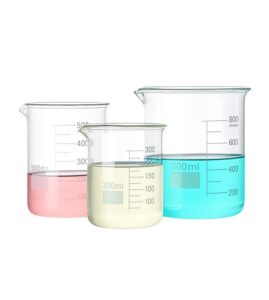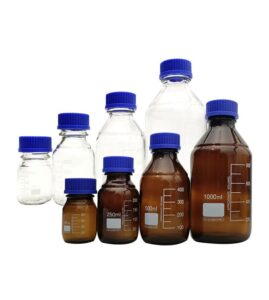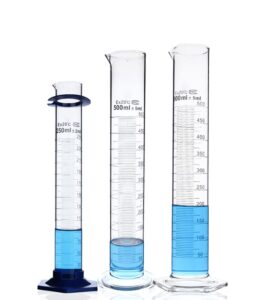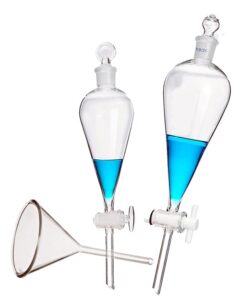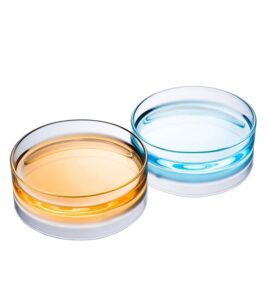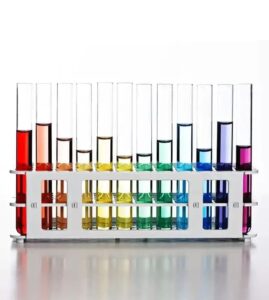Ever found yourself overwhelmed while trying to select the best lab glassware for your scientific experiments or educational purposes? Wondering what makes one piece of glassware stand out from another in terms of quality and reliability? You’re not alone. The vast array of options can be daunting.
Selecting high-quality lab glassware is crucial for achieving accurate and reproducible results in any laboratory setting. It ensures the safety and efficiency of your experiments, saving time and resources in the long run. Let’s dive into how you can find the best lab glassware for your needs, ensuring your research or educational endeavors are built on a foundation of reliability and precision.
Stay tuned to uncover key factors in choosing the right lab glassware.
What Makes Lab Glassware “High-Quality”?
Quality in lab glassware is determined by several factors, including material, durability, accuracy, and manufacturer reputation. Material is crucial, as high-quality lab glassware is typically made from borosilicate glass, renowned for its resistance to thermal shock and chemical corrosion. Durability ensures that the glassware can withstand repeated use and cleaning without compromising its integrity. Accuracy is essential for measuring glassware, where precise graduations are necessary for reliable results. Lastly, the reputation of the manufacturer can be a good indicator of overall quality, as well-established companies often adhere to stricter quality control standards.
Key Considerations When Purchasing Lab Glassware
When it comes to purchasing lab glassware, several considerations should be at the forefront of your decision-making process:
Purpose: Understanding Specific Uses
Before purchasing lab glassware, it’s crucial to understand the specific functions and types of experiments it will be used for. Different types of glassware are designed for varied applications—beakers for mixing and heating liquids, volumetric flasks for precise volume measurements, and Erlenmeyer flasks for titrations and storage. Assessing the purpose of the glassware ensures that you select pieces that are not only suitable for your experiments but also enhance your laboratory’s efficiency and accuracy.
Quality Standards: Meeting International Benchmarks
Quality standards like ISO (International Organization for Standardization) and ASTM (American Society for Testing and Materials) provide benchmarks for glassware durability, accuracy, and safety. Choosing glassware that meets these standards ensures that you are investing in products that have been rigorously tested and proven to perform reliably in laboratory settings. Such adherence not only supports the integrity of your experiments but also contributes to the overall safety and quality assurance of your research.
Chemical Compatibility: Ensuring Safe Reactions
The glassware you select must be compatible with the chemicals used in your experiments to prevent adverse reactions that could compromise safety and experiment integrity. This involves understanding the chemical resistance of the glassware material—whether it can withstand aggressive solvents, acids, bases, and other reagents without degradation. Selecting chemically compatible glassware minimizes the risk of equipment failure, contamination, and hazardous incidents, ensuring a safe laboratory environment.
Volume and Measurement Accuracy: Ensuring Precise Quantifications
For quantitative experiments, the accuracy of volume measurements is paramount. High-quality measuring glassware, such as graduated cylinders, burettes, and pipettes, should have clearly marked, durable graduations that are easy to read. These markings should be certified for accuracy according to standardized calibration methods. Accurate measurement is crucial for achieving reproducible results and maintaining the credibility of your experimental data.
Thermal and Mechanical Durability: Withstanding Laboratory Conditions
Lab glassware must endure thermal shocks, high temperatures, and mechanical stress without compromising its structural integrity. Borosilicate glass, known for its low coefficient of thermal expansion, offers excellent resistance to thermal shock, making it ideal for applications involving rapid temperature changes. Additionally, the mechanical durability of the glassware—its resistance to scratching, breaking, and wear over time—ensures that it can withstand regular use and cleaning, representing a long-term investment in your laboratory’s capabilities.
Ergonomics and User-Friendliness
The design of lab glassware should facilitate easy and safe handling, particularly during complex or long-lasting experiments. Ergonomic features, such as easy-to-grip surfaces, lightweight construction, and stability when placed on lab benches, can significantly reduce the risk of accidents and increase user comfort. Additionally, the ease of connection to other lab equipment, such as clamps and stands, should be considered to streamline experimental setups.
Cleaning and Maintenance
Selecting glassware that is easy to clean and maintain can save valuable time and resources. Consider the compatibility of the glassware with common cleaning agents and procedures. Some high-quality glassware is designed to resist etching and clouding over time, maintaining its clarity and integrity even after repeated cleaning cycles. Glassware that can be autoclaved for sterilization without risking damage is particularly valuable in microbiology and biochemistry applications.
Environmental Impact
The environmental impact of producing and disposing of lab glassware is becoming an increasingly important consideration. Glassware made from recyclable materials or designed for long-term reuse can help reduce the laboratory’s environmental footprint. Manufacturers who adopt environmentally friendly production practices or offer recycling programs for used glassware should be prioritized.
Cost Over Lifecycle
While the initial purchase price of lab glassware is an important consideration, evaluating the total cost over its lifecycle offers a more comprehensive view of its value. High-quality glassware that lasts longer and requires fewer replacements can be more cost-effective in the long run, despite a higher upfront cost. Consideration of warranty offers and after-sales support can also influence the long-term value of the investment.
Customization Options
Certain experiments may require glassware with specific dimensions, volumes, or other custom features. Suppliers who offer customization services can provide solutions tailored to your laboratory’s unique needs, albeit often at a higher price. Assessing the availability and cost of customization can be crucial for specialized research applications.
Where to Find High-Quality Lab Glassware?
Finding high-quality lab glassware involves knowing where to look. Trusted suppliers and manufacturers with a long-standing reputation in the scientific community are often your best bet. Online marketplaces can offer convenience and a wide selection, but ensure you vet the sellers and read reviews thoroughly. Additionally, attending scientific conferences or trade shows can provide opportunities to see the glassware firsthand and speak directly with suppliers.
Assessing Lab Glassware Quality Through Visual Inspection: A Beginner’s Guide
Judging the quality of lab glassware at first glance may seem challenging, but there are visual cues that can help you make a preliminary assessment before purchase or use. This ability is particularly valuable when comparing options in person or when the detailed specifications of a product are not readily available.
Start by examining the clarity and uniformity of the glass. High-quality lab glassware should be crystal clear, without any bubbles, scratches, or imperfections. These defects can not only affect the structural integrity of the glassware but may also interfere with the accuracy of measurements and observations.
Next, pay attention to the thickness of the glass. Uniform thickness across the entire piece is a sign of well-crafted glassware, indicating that it can withstand thermal shocks and chemical reactions more reliably. For measuring instruments like volumetric flasks or graduated cylinders, the precision of the graduations is crucial. The markings should be clear, easy to read, and evenly spaced, reflecting the glassware’s accuracy in measurements.
Lastly, assess the overall craftsmanship. Joints and connections should be smooth and seamless, indicating that the glassware can maintain a vacuum or contain fluids without leaking. The base of the glassware should be stable and flat, ensuring that it won’t easily tip over during use.
In conclusion, while a detailed inspection and understanding of material specifications are essential for selecting the highest quality lab glassware, a preliminary visual inspection can also provide valuable insights into its quality. This initial assessment can help narrow down your options before further investigation, ensuring that you choose glassware that meets both your scientific needs and quality standards. By integrating these visual checks into your selection process, you’re taking an important step towards maintaining the integrity and reliability of your laboratory work.
Comprehensive Guide to Selecting High-Quality Lab Glassware
In the realm of laboratory work, glassware plays an indispensable role. Selecting high-quality glassware is crucial for ensuring the accuracy of experimental results and the safety of the experimental process. So, what should we pay attention to when purchasing lab glassware? Let’s delve into the details.
Material Requirements
The material of lab glassware directly affects its durability and safety. High-quality glassware is typically made from borosilicate glass or quartz glass, known for their high resistance to heat and corrosion. This resistance allows them to withstand the high temperatures and chemical reagents encountered during experiments. When shopping, you can preliminarily judge the quality of the material by observing the glass’s transparency and tapping it to listen to the sound it makes.
Craftsmanship Standards
The craftsmanship of lab glassware is equally important. Fine craftsmanship ensures the precision and stability of the instrument. For instance, the interfaces should be smooth and flawless, and the scale lines should be clear and accurate. Additionally, the design of the instruments should conform to ergonomics, making them easy to hold and operate. When buying, closely observe the appearance and details of the instrument to judge its level of craftsmanship.
Brand Reputation
Brand reputation is an aspect that cannot be overlooked when choosing lab glassware. Well-known brands usually have a comprehensive production system and strict quality control standards, offering more reliable product guarantees. Moreover, renowned brands often provide better after-sales service, promptly addressing any issues that arise during use.
Consideration of Applicability
When selecting lab glassware, it’s also necessary to consider the specific needs of the experiment. Different experiments have varying requirements for the specifications, shapes, and precision of instruments. Therefore, before making a purchase, it’s important to clarify experimental needs and choose the appropriate type and specifications of instruments. Compatibility should also be taken into account to ensure the glassware can be used in conjunction with other laboratory equipment.
Price and Cost-Effectiveness
Although price is an important factor in the purchasing decision, it should not be the sole criterion. When choosing lab glassware, both price and cost-effectiveness must be considered. High-quality glassware might be pricier, but its durability, stability, and precision can provide a better experimental experience and more accurate results. Thus, when making a purchase, one should weigh the relationship between price and performance, opting for products that offer high value for money.
Safety Certification
Safety certification is a crucial guarantee of lab glassware quality. When purchasing, attention should be paid to whether the product has passed relevant safety certifications, such as ISO or CE certification. These certifications prove that the product meets international safety standards, providing peace of mind during use.
Selecting high-quality lab glassware requires a comprehensive consideration of material, craftsmanship, brand, applicability, price, and safety certification. By taking these factors into account, one can choose laboratory instruments that not only meet experimental requirements but are also safe and reliable, ensuring smooth progress in laboratory work.
Ensuring Your Lab Glassware Stays High-Quality
Purchasing high-quality lab glassware is only the first step. Proper maintenance and handling are essential to preserve its quality over time:
- Cleaning: Follow best practices for cleaning glassware, using appropriate detergents and avoiding abrasive materials that can scratch the glass.
- Storage: Store glassware in a safe, dry place to prevent damage and contamination.
- Regular Inspections: Regularly inspect your glassware for any signs of wear, damage, or measurement inaccuracies.
Identifying the Right Supplier for Lab Glassware
Finding a reputable supplier is as important as selecting the glassware itself. A good supplier should offer a wide range of products, provide detailed product specifications, and have knowledgeable staff to answer your questions. They should also offer warranties or guarantees on their products, showcasing their confidence in the quality of their glassware.
Research suppliers online, check for customer reviews, and ask for recommendations from peers in the scientific community. Suppliers who are willing to provide samples or who have a transparent return policy can also be a good choice, as they allow you to test the quality of the glassware before making a large investment.
The Importance of Certification and Standards
Lab glassware that meets recognized standards and certifications is more likely to be of high quality. Look for glassware that has been certified by relevant authorities or organizations, such as the American Society for Testing and Materials (ASTM) or the International Organization for Standardization (ISO). These certifications ensure that the glassware has been rigorously tested for quality and safety, providing an extra layer of trust and reliability.
Price vs. Quality: Striking the Right Balance
While budget constraints are a reality in many laboratory settings, it’s crucial not to compromise on quality when it comes to lab glassware. Cheaper, lower-quality glassware may seem like a good deal initially, but it can lead to inaccurate results, more frequent replacements, and ultimately higher costs in the long run. Investing in high-quality glassware from reputable suppliers might require a higher upfront cost but will save money and ensure reliability and safety over time.
Tailoring Your Choice to Your Lab’s Needs
Different laboratories have different needs based on their specific research areas, experiments, and protocols. Tailor your selection of lab glassware to these needs by considering the types of experiments you conduct, the chemicals you use, and the precision you require. For instance, a chemistry lab involved in volatile organic compound analysis will have different requirements than a microbiology lab focusing on culture growth.
Educating Your Team on Glassware Quality and Care
Finally, educating your team on the importance of high-quality lab glassware and how to care for it can significantly impact its lifespan and reliability. Regular training sessions on the proper use, cleaning, and storage of glassware can help prevent accidents, contamination, and degradation of glassware quality. Encourage a culture of responsibility and attention to detail when handling lab equipment.
Conclusion
When it comes to equipping your laboratory with the best glassware, knowledge is power. By prioritizing quality, compatibility, and sustainability, and by educating your team on proper care, you’re investing in the future of your research. Take action today: assess your needs, research your options, and commit to quality. Your experiments deserve the best – ensure their success by choosing the right lab glassware.


